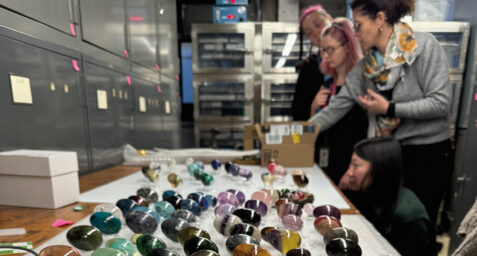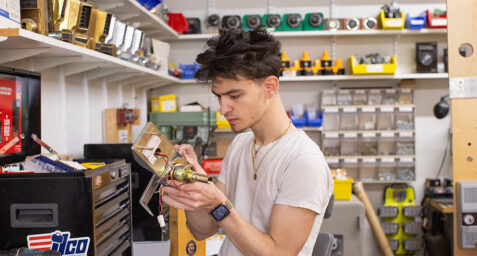Working With Head Technicians & Celebrated Musicians

Categories
Piano TechnologyEducating Basic (PT) and Advanced (PA) Piano Technology students for employment may begin in the School’s practice rooms and program spaces, but the work doesn’t end there.
Newly learned skills are tested in the real world, via a wide variety of internship opportunities. From tuning grand pianos at summer music festivals to servicing upright models in the Boston Public Schools, Piano Technology students have the chance to work with head technicians and celebrated musicians in pursuit of their craft.
For those who have completed the PT program, there are more internship opportunities than there are available students to fill them. The School has long-standing relationships with nationally renowned organizations that include the Tanglewood Music Center in Massachusetts, the Aspen Music Festival and School in Colorado, and the Interlochen Center for the Arts in Michigan. Many of those internships lead to high-profile jobs at places like Steinway & Sons and the Juilliard School.
“If you stand out, you’re going to get a really good recommendation from these head technicians, who are well known throughout the industry,” says Instructor Debbie Cyr PA ’93. Proof positive, the head piano technicians at the Curtis Institute of Music and the San Francisco Conservatory of Music are each NBSS graduates.
“It’s normally unheard of for someone with one year of experience to get a job at a place like an Ivy League university or music conservatory,” notes PT instructor Emily Townsend PA ’08.
During the school year, PA students go out on tuning calls for local customers in private homes and other venues, and then share their experiences with fellow students and staff. “It gives them practice out in the field and some experience with all kinds of pianos and customers,” Debbie says.
“It’s normally unheard of for someone with one year of experience to get a job at a place like an Ivy League university or music conservatory.”
Another opportunity for students to apply their tuning chops comes from the Boston Public Schools (BPS), which has used NBSS students to maintain the school system’s pianos for the past four years. The program is funded by the BPS Arts Expansion Fund at EdVestors, a Boston-based education non-profit focused on improving educational outcomes for students. Students tune the pianos and then create invoices and a report on each piano they work on.
“It gives the students a little bit of pocket money and some business experience, and of course the BPS teachers are over the moon,” Debbie says. “It’s been a winning situation for everybody.”
The abundance of opportunities like these reflects the robust job market for piano technicians, who are now retiring faster than new ones can be trained. “There’s a humongous black hole for piano technicians all over the world,” Debbie says. “We get a lot of requests from universities or guys who are retiring.”
“We’re the place that has stood the test of time,” Emily says. “It’s the caliber of grads we put out there.”
This is one of nine program stories from the NBSS 2016 Annual Report. Download the full Report here, or see more issues on our Publications page.




